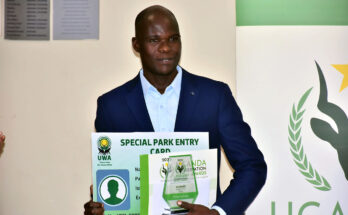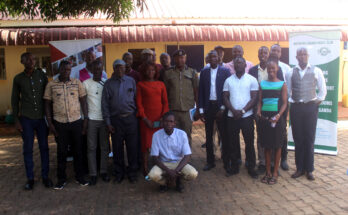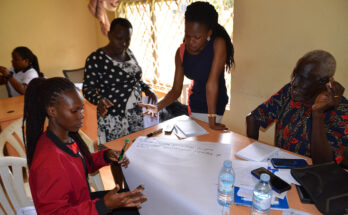Since 2019, journalists in northern Uganda, like their counterparts in other regions, have confronted some of the harshest realities in their line of work.
They faced a myriad of challenges in their reporting. But the biggest of all was the pandemic. The health crisis, which came with so many obstacles, impeded both movements of journalists and impacted negatively on press freedom, among several other complexities. Many newsrooms were financially stressed even more; many journalists were temporarily laid off from work or forced to quit. Also, during that time, there were many reported cases of journalists being harassed by the security apparatus for covering COVID-19-related restrictions after curfew.
These were challenges that gravely affected press freedom, and so they needed to be addressed by the bell. But around that time, Northern Uganda Media Club (NUMEC) had also received funding from UNESCO’s International Programme for the Development of Communications (IPDC). The grant was meant to ‘strengthen collaborative journalism and joint advocacy for press freedom in northern Uganda’, where a platform would be established to bolster the organisation’s networking and advocacy capacity.
Although NUMEC has been engaged in media development work for several years, its advocacy capacity has been limited, both in terms of human resources and geographical space, in previous years. Therefore, with UNESCO’s support, there was a strong need for NUMEC to connect with its membership, not just in Acholi sub-region but also as far as Lango and West Nile sub-region.
One of the critical steps that NUMEC did first was to remain firmly committed to promoting safety for journalists and advocating for press freedom. A case in point was that of Emmy Ojara, a journalist who works for the Uganda Radio network. Ojara was physically harassed twice, first by thugs and later by the police, last year on his way home after curfew. NUMEC was able to foot his medical bills at the time he was critically injured and unable to work.
NUMEC also reached out to several media outlets in Gulu city to moot a way on how best journalists can be protected from night attacks. (A small survey was done by NUMEC at the time and it was found that 12 journalists were victims of the night attacks in a space of one month.) The meeting was productive. Some media houses decided they would provide spaces for journalists to spend their night after working late while others opted to adjust their programs to autoplay to enable their staff to leave their workplaces early.
Then another incident happened this year in March when five journalists in Gulu were arrested and detained by the prison authorities on allegations of trespassing on Uganda Prison’s installation in Gulu, NUMEC administration intervened for them to be released. Although the journalists had their equipment confiscated and data deleted, the truth was that had not committed any crime when interviewed by a group of Members of Parliament who had gone on a fact-finding visit to Gulu’s main prison.
“We were in [the] middle of the interview [with members of parliament] when a uniformed prison guard showed up, pulled his rifle at us and said we were under arrest,’’ said Miss Gloria Lalam, a journalist for the Gulu-based, Catholic church-owned Radio Pacis, who sent a quick message on NUMEC WhatsApp group. NUMEC management acted quickly on that message by contacting the district authorities leading to the release of the journalists.
But journalists, especially freelancers who may not have permanent workstations, are at risk and continue to face harassment after curfew by law enforcement officers who very well know they have journalists are classified as essential workers. But journalists in Gulu know very well that every time they run into trouble, they are obligated to alert NUMEC’s WhatsApp group, which was created to improve coordination.
Female journalists were badly affected too
Female journalists, face a dome of unique challenges, among them being sexual harassment and assault. Although these challenges have been there they have increased since the start of the COVID-19 pandemic, according to female reporters. As an activity under advocacy, NUMEC used its facilities to host a press conference on Women’s Day for female journalists in northern Uganda who has a candid discussion about these challenges and how best they can be addressed. (NUMEC was able to record a video from a bold female journalist, with her consent, on these challenges.)
Collaboration and partnerships
It is not often that NUMEC meets 30 journalists from different parts of northern Uganda in one place to conduct engagement training so as to discuss issues affecting journalism and the media. In December last year and January this year, NUMEC held pieces of training for both journalists in Lango and Acholi sub-region, respectively. The overall objective of the training was to equip the journalists with the fundamentals of good journalism, ensure they have a firm grasp of the legal regulatory framework for the media in Uganda, use online resources to conduct research and check against fake news, collaboratively work on story ideas to produce compelling pieces of journalism, and also increase participants appreciation on safety and advocacy for press freedoms.
The training also spurred a multiplicity of views and concerns from journalists which enabled NUMEC to further map out the key concerns affecting the media. The information gathered was useful for informing NUMEC’s continued advocacy and capacity-building efforts. A WhatsApp group was also created in the process for the journalists to have direct contact with NUMEC in the event they face any threats in the course of their professional work. The social media platform has been useful for sharing journalism opportunities, discussing story ideas, and mentoring younger and relatively inexperienced journalists.
Also, after the end of that training, the journalists were tasked to form groups and pitch story ideas. NUMEC awarded them with its first-of-its-kind collaborative grants. And the moment the journalists are working on their stories –thanks to half of the grant that has already been given to them— and the rest of the payment will be reimbursed to each group once their stories are completed.
Besides collaboration among journalists, NUMEC as an institution itself has partnered with like-minded organisations, such as United Nations High Commissioner for Human Rights (UN OCHA) and Media Focus, a Kampala-based media organisation, as part of efforts to strengthen its advocacy capacity by networking in promoting human rights and media development. The last virtual meeting, which was themed on the ‘role of the media as a public good’, served as an opportunity for journalists to meet and assess the risks they face and how best they can be addressed in the course of their work.
NUMEC also organized a virtual media forum in July this year to sensitization of journalists on the need for media literacy, media policies, and media regulatory framework in Uganda amid the COVID-19 pandemic. More than 40 journalists from across the country together, with key discussants such as Gulu Resident District Commissioner, Stephen Odong Latek; renowned Human Rights lawyer, Nicholas Opiyo; and also an investigative journalist and Executive Director of the African Centre for Investigative Journalism (ACIJ), Solomon Sserwanja, attended the event.
A number of key observations were made during the meeting including the dwindling civic space in Uganda, the attacks directed at the media, and the dire consequences on the business side of media organisations which has resulted in many journalists losing their jobs.
Solutions to some of the challenges faced by journalists were proposed such as the need for collaboration and partnership between media organisations to pool resources for collaborative journalism. Furthermore, in the event of threats, journalists were urged to use organisations like NUMEC, which can in turn work with Chapter Four, to access free legal services for journalists.
Noteworthy, these engagements played a great in the media development in the region, thanks to the support from UNESCO which has since greatly improved NUMEC’s engagement in terms of coordinating with its membership, building capacity and visibility in northern Uganda which is important for the long-term sustainability of the organization.




